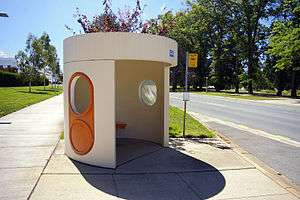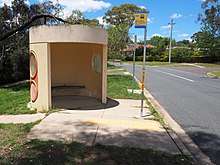Concrete bus shelters in Canberra
The concrete bus shelters in Canberra are considered an icon of the city.[1] Installation of the cylindrical bus shelters began in 1975 and continued into the early 1990s. At least 477 were purchased, of which 455 remained in use by ACTION buses as of 2016.

Design
The bus shelters were designed in 1974 for the National Capital Development Commission by the architect Clem Cummings.[2] Cummings' design was for a cylindrical shelter made from concrete, with window frames on each side and a bench made from fibreglass. The windows were made from Lexan. ArchivesACT has stated that the design is an example of brutalist architecture.[2]
Various minor amendments were made to the design after the first series was installed; for instance, "Series II" shelters had a precast concrete floor and no backrest for the bench. The Series II shelters located near schools did not have a bench.[2] Since they were first installed, the shelters have been painted cream colour, and their fibreglass window frames and benches have been orange.[1]
The shelters' Lexan windows proved to be a weak point. They were easily damaged by vandals, and could be pushed out of their frames or burnt. The ACT Transport Branch experimented with a different type of Lexan, but it also proved unsatisfactory. Consideration was given to using wire glass, but this option was rejected after glaziers advised the government that such windows would be more dangerous than Lexan if they were shattered. Efforts to replace damaged windows were eventually abandoned, and many of the shelters are now windowless. This has led to complaints about the shelters being cold and drafty.[1][2]
Installation

The first 98 "Series I" shelters were installed during 1975 as part of a broader project to upgrade Canberra's bus network.[2] At this time it was intended that the shelters would eventually be installed at almost all bus stops in the city.[3] Another 207 shelters were installed between the 1976–77 and 1979-80 financial years. Shelters continued to be sporadically purchased and installed during the 1980s and early 1990s.[2] By the time construction was complete, at least 477 shelters had been installed.[1] Bus shelters installed in Canberra since the early 1990s have been made from steel and glass.[4]
During the 1980s and 1990s murals were painted inside some of the bus shelters by school children and community groups; this effort was sponsored by ACTION as a way of discouraging vandalism and promoting community art. ACTION ran an annual mural painting competition between 1987 and at least 1992.[5] By 1992, murals had been painted inside about 200 bus shelters.[6]
As of 2016, 455 of the concrete bus shelters remained in use. A total of 64 of the shelters were relocated after 2007 when they were replaced with glass shelters which include advertising.[1] Other shelters were relocated in the mid-2010s when ACTION's bus stops were upgraded to improve their accessibility for people with disability.[7]
The ACT Government intends to retain the shelters for as long as possible, with the Director of Capital Works at Transport Canberra and City Services telling the Australian Broadcasting Corporation in 2016 that "they just last forever because of the material they're made out of, [and] the way they're designed".[1] Bus shelters at stops which will no longer be serviced following a planned major reform to ACTION routes in 2019 will be reinstalled elsewhere.[8]
Several concrete bus shelters built to Cummings' design have been installed outside of Canberra.[1]
Iconic status
ArchivesACT has written that "over the years, the concrete shelters have become an admired element of Canberra's urban landscape" and they are "arguably Canberra's most endearing piece of urban architecture".[2] The ABC and Canberra Times have described them as "iconic".[1][8] They are often called "bunker" bus shelters by Canberrans.[8]
The artist Trevor Dickinson has become well known for his drawings of the shelters, created as part of a project to record all of them. An exhibition of Dickinson's work was hosted by the Canberra Museum and Gallery in 2018.[8][9] An ACTION bus was also wrapped with some of Dickinson's drawings to coincide with the exhibition.[10]
Despite their iconic status, none of the concrete bus shelters have been heritage listed.[8]
References
| Wikimedia Commons has media related to Bus stops in Canberra. |
- Gee, Sonya. "Are Canberra's iconic bus shelters found anywhere else in the world?". ABC News. Retrieved 4 November 2018.
- "Concrete Monstrosities or Canberra Icons? C.G. Cummings Plans for the Concrete Bus Shelter". Previous find of the month. ArchivesACT. May 2016. Retrieved 4 November 2018.
- Wright, Bruce (21 March 1975). "New shelters for ACT bus stops". The Canberra Times. p. 8. Retrieved 4 November 2018 – via National Library of Australia.
- Back, Alexandra (15 February 2016). "Heritage protection likely for Canberra's timber bus shelters". The Canberra Times. Retrieved 4 November 2018.
- "The Urban Environment Enhanced: The ACTION/Montone Bus Shelter Painting Competition". Previous find of the month. ArchivesACT. February 2015. Retrieved 4 November 2018.
- Clack, Peter (22 September 1992). "MLAs give graffiti the thumbs down — 'It is not art'". The Canberra Times. p. 3. Retrieved 4 November 2018 – via National Library of Australia.
- Haider, Talib (18 July 2018). "Canberra to retain iconic concrete bus stops during accessibility upgrade, ACT Government says". ABC News. Retrieved 4 November 2018.
- Burgess, Katie (6 August 2018). "Iconic bunker bus stops left idle by network change to be moved". The Canberra Times. Retrieved 4 November 2018.
- "Trevor Dickinson's beautiful bus shelters of Canberra". Canberra Museum and Gallery. Retrieved 4 November 2018.
- Kanapathippillai, Julia (24 October 2018). "Canberra's iconic bus shelters hitch a ride". The Canberra Times. Retrieved 4 November 2018.